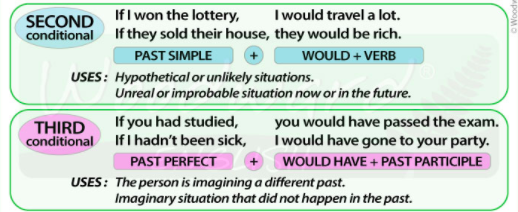Let´s continue and finish with conditional clauses
Take a look at Woodward English charts and curso de ingles explanations
Second Conditional (Tipo 2)
Se utiliza el tipo 2 para expresar una posibilidad irreal en el presente, como un deseo o un sueño, o para una acción en el futuro no tan probable.
| IF | Condition | Result |
|---|---|---|
| If | past simple | “would” + infinitivo |
Ejemplos:
| If I won the lottery, I would travel around the world. / I would travel around the world if I won the lottery.(Si ganara la lotería, viajaría alrededor del mundo.) |
| If Rachel had more time, she would learn to play the guitar. / Rachel would learn to play the guitar if she had more time.(Si Rachel tuviera más tiempo, aprendería a tocar la guitarra.) |
| Would you be happy if you were to get married? / If you were to get married, would you be happy?(¿Estarías feliz si te casaras?) |
Nota: Como en el tipo 1, se pueden usar otros verbos modales en vez de “would” para cambiar el significado y la posibilidad.
Third Conditional (Tipo 3)
A diferencia a los tipos 1 y 2, se utiliza el tercer tipo de condicional cuando hablamos de una condición en el pasado que no ha sucedido.
| IF | Condition | Result |
|---|---|---|
| If | past perfect | “would have” + past participle |
Ejemplos:
Nota: Como en los tipos 1 y 2, se pueden usar otros verbos modales en vez de “would” para cambiar el significado y la probabilidad.

No comments:
Post a Comment